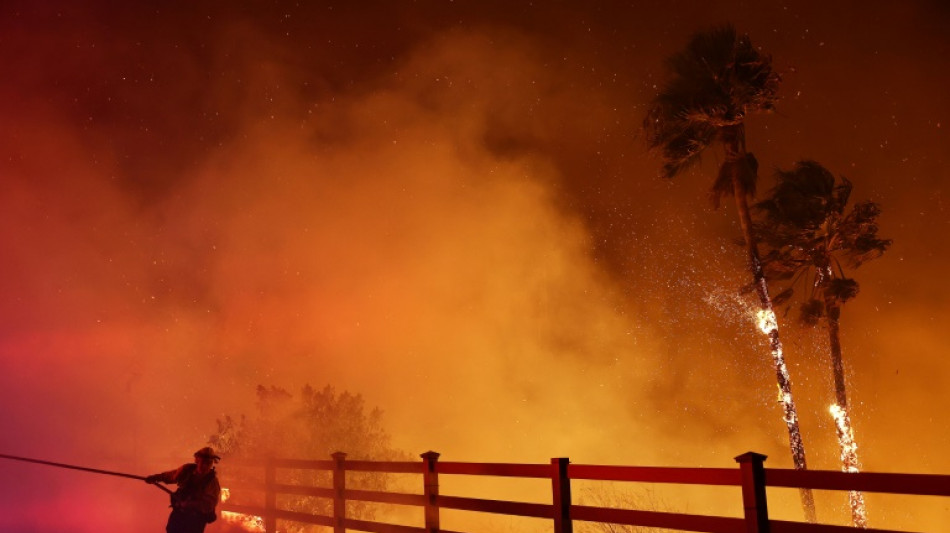
-
 Lillard will try to match record with third NBA 3-Point title
Lillard will try to match record with third NBA 3-Point title
-
Vonn breaks leg as crashes out in brutal end to Olympic dream

-
 Malinin enters the fray as Japan lead USA in Olympics team skating
Malinin enters the fray as Japan lead USA in Olympics team skating
-
Thailand's Anutin readies for coalition talks after election win

-
 Fans arrive for Patriots-Seahawks Super Bowl as politics swirl
Fans arrive for Patriots-Seahawks Super Bowl as politics swirl
-
'Send Help' repeats as N.America box office champ

-
 Japan close gap on USA in Winter Olympics team skating event
Japan close gap on USA in Winter Olympics team skating event
-
Liverpool improvement not reflected in results, says Slot

-
 Japan PM Takaichi basks in election triumph
Japan PM Takaichi basks in election triumph
-
Machado's close ally released in Venezuela

-
 Dimarco helps Inter to eight-point lead in Serie A
Dimarco helps Inter to eight-point lead in Serie A
-
Man City 'needed' to beat Liverpool to keep title race alive: Silva

-
 Czech snowboarder Maderova lands shock Olympic parallel giant slalom win
Czech snowboarder Maderova lands shock Olympic parallel giant slalom win
-
Man City fight back to end Anfield hoodoo and reel in Arsenal

-
 Diaz treble helps Bayern crush Hoffenheim and go six clear
Diaz treble helps Bayern crush Hoffenheim and go six clear
-
US astronaut to take her 3-year-old's cuddly rabbit into space

-
 Israeli president to honour Bondi Beach attack victims on Australia visit
Israeli president to honour Bondi Beach attack victims on Australia visit
-
Apologetic Turkish center Sengun replaces Shai as NBA All-Star

-
 Romania, Argentina leaders invited to Trump 'Board of Peace' meeting
Romania, Argentina leaders invited to Trump 'Board of Peace' meeting
-
Kamindu heroics steer Sri Lanka past Ireland in T20 World Cup

-
 Age just a number for veteran Olympic snowboard champion Karl
Age just a number for veteran Olympic snowboard champion Karl
-
England's Feyi-Waboso out of Scotland Six Nations clash

-
 Thailand's pilot PM lands runaway election win
Thailand's pilot PM lands runaway election win
-
Sarr strikes as Palace end winless run at Brighton

-
 Olympic star Ledecka says athletes ignored in debate over future of snowboard event
Olympic star Ledecka says athletes ignored in debate over future of snowboard event
-
French police arrest six over crypto-linked magistrate kidnapping

-
 Auger-Aliassime retains Montpellier Open crown
Auger-Aliassime retains Montpellier Open crown
-
Lindsey Vonn, skiing's iron lady whose Olympic dream ended in tears

-
 Conservative Thai PM claims election victory
Conservative Thai PM claims election victory
-
Kamindu fireworks rescue Sri Lanka to 163-6 against Ireland

-
 UK PM's top aide quits in scandal over Mandelson links to Epstein
UK PM's top aide quits in scandal over Mandelson links to Epstein
-
Reed continues Gulf romp with victory in Qatar

-
 Conservative Thai PM heading for election victory: projections
Conservative Thai PM heading for election victory: projections
-
Vonn crashes out of Winter Olympics in brutal end to medal dream

-
 Heartache for Olympic downhill champion Johnson after Vonn's crash
Heartache for Olympic downhill champion Johnson after Vonn's crash
-
Takaichi on course for landslide win in Japan election

-
 Wales coach Tandy will avoid 'knee-jerk' reaction to crushing England loss
Wales coach Tandy will avoid 'knee-jerk' reaction to crushing England loss
-
Sanae Takaichi, Japan's triumphant first woman PM

-
 England avoid seismic shock by beating Nepal in last-ball thriller
England avoid seismic shock by beating Nepal in last-ball thriller
-
Karl defends Olympic men's parallel giant slalom crown

-
 Colour and caution as banned kite-flying festival returns to Pakistan
Colour and caution as banned kite-flying festival returns to Pakistan
-
England cling on to beat Nepal in last-ball thriller

-
 UK foreign office to review pay-off to Epstein-linked US envoy
UK foreign office to review pay-off to Epstein-linked US envoy
-
England's Arundell eager to learn from Springbok star Kolbe

-
 Czech snowboard great Ledecka fails in bid for third straight Olympic gold
Czech snowboard great Ledecka fails in bid for third straight Olympic gold
-
Expectation, then stunned silence as Vonn crashes out of Olympics

-
 Storm-battered Portugal votes in presidential election run-off
Storm-battered Portugal votes in presidential election run-off
-
Breezy Johnson wins Olympic downhill gold, Vonn crashes out

-
 Vonn's Olympic dream cut short by downhill crash
Vonn's Olympic dream cut short by downhill crash
-
French police arrest five over crypto-linked magistrate kidnapping


Scientists struggle to explain record surge in global heat
The world has been getting hotter for decades but a sudden and extraordinary surge in heat has sent the climate deeper into uncharted territory -- and scientists are still trying to figure out why.
Over the past two years, temperature records have been repeatedly shattered by a streak so persistent and puzzling it has tested the best-available scientific predictions about how the climate functions.
Scientists are unanimous that burning fossil fuels has largely driven long-term global warming, and that natural climate variability can also influence temperatures one year to the next.
But they are still debating what might have contributed to this particularly exceptional heat surge.
Experts think changes in cloud patterns, airborne pollution, and Earth's ability to store carbon could be factors, but it would take another year or two for a clearer picture to emerge.
"Warming in 2023 was head-and-shoulders above any other year, and 2024 will be as well," said Gavin Schmidt, director of the NASA Goddard Institute for Space Studies, in November.
"I wish I knew why, but I don't," he added.
"We're still in the process of assessing what happened and if we are seeing a shift in how the climate system operates."
- 'Uncharted territory' -
When burned, fossil fuels emit greenhouse gases like carbon dioxide that trap heat near the Earth's surface.
As fossil fuel emissions have risen to record highs in 2023, average sea surface and air temperatures have curved upwards in a consistent, decades-long warming trend.
But in an unprecedented streak between June 2023 and September 2024, global temperatures were unlike anything seen before, said the World Meteorological Organization -- and sometimes by a considerable margin.
The heat was so extreme it was enough to make 2023 -- and then 2024 -- the hottest years in history.
"The record global warmth of the past two years has sent the planet well into uncharted territory," Richard Allan, a climate scientist from the UK's University of Reading, told AFP.
What occurred was "at the limit of what we would expect based on existing climate models", Sonia Seneviratne, a climatologist from ETH Zurich in Switzerland, told AFP.
"But the overall long-term warming tendency is not unexpected" given the amount of fossil fuels being burned, she added.
- 'Difficult to explain' -
Scientists said that climate variability could go some way to explaining what happened.
2023 was preceded by a rare, three-year La Nina phenomenon that had a strong cooling effect on the planet by pushing excess heat into the deep oceans.
This energy was released back to the surface when an opposite, warming El Nino event took over in mid-2023, boosting global temperatures.
But the heat has lingered even after El Nino peaked in January.
Temperatures have not fallen as fast as they rose, and November was still the second-warmest on record.
"It is difficult to explain this at the moment," said Robert Vautard, a member of the UN's climate expert panel IPCC. "We lack a bit of perspective.
"If temperatures do not drop more sharply in 2025, we will really have to ask ourselves questions about the cause," he told AFP.
- Jury out -
Scientists are looking for clues elsewhere.
One theory is that a global shift to cleaner shipping fuels in 2020 accelerated warming by reducing sulphur emissions that make clouds more mirror-like and reflective of sunlight.
In December, another peer-reviewed paper looked at whether a reduction in low-lying clouds had let more heat reach Earth's surface.
At the American Geophysical Union conference this month, Schmidt convened scientists to explore these theories and others, including whether solar cycles or volcanic activity offered any hints.
There are concerns that without a more complete picture, scientists could be missing even more profound and transformational shifts in the climate.
"We cannot exclude that some other factors also further amplified the temperatures... the verdict is still out," said Seneviratne.
Scientists this year warned that Earth's carbon sinks -- such as the forests and oceans that suck CO2 from the atmosphere -- had suffered an "unprecedented weakening" in 2023.
This month, the US National Oceanic and Atmospheric Administration said the Arctic tundra, after locking away C02 for millennia, was becoming a net source of emissions.
Oceans, which have acted as a massive carbon sink and climate regulator, were warming at a rate scientists "cannot fully explain", said Johan Rockstrom of the Potsdam Institute for Climate Impact Research.
"Could this be a first sign of a planet starting to show a loss of resilience? We cannot exclude it," he said last month.
H.Darwish--SF-PST




